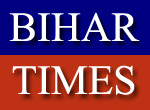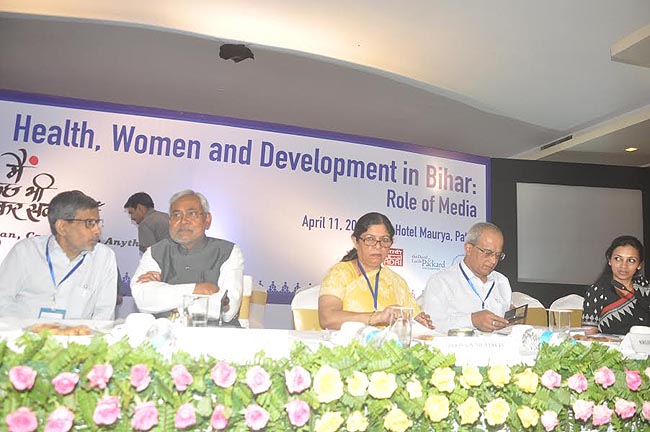|
13/04/2015 Educating girls best way to stabilise population: Nitish |
Patna, April 11, 2015 : Inaugurating the ‘Health, Women and Development in Bihar: Role of Media’ workshop Chief Minister Nitish Kumar emphasized the need to focus on population stabilization and said the proactive work done by the three lakh Self Help Groups (SHGs) and the remarkably improved status in the education of the girl children are the two key parameters of growth in the state. “We have found that educating girls is the best way to stabilise the population. Data reveals that the average fertility rate of girls educated till class 10 in the country is 2 and it was the same in Bihar also. The fertility rate drops to 1.7 if the girl is educated till class 12, but in Bihar it was 1.6, which is better than the national average,” Kumar said. “While seeing the data related to the fertility rate of educated girls, we have decided to open ‘plus two’ (higher secondary) schools in all village panchayats and we are working on a five-year target to complete it. If all girls in Bihar study till class 12, the fertility rate will go down,” he added. “Women’s SHGs have gone a long way in bringing about women’s empowerment in all spheres particularly healthcare and rural livelihood. The poshak and cycle schemes changed the mindset of an entire era. Now is the need for qualitative change,”Kumar said The event was also marked by the Chief Minister launching Season 2 of the path-breaking serial, Main Kuch Bhi Kar Sakti Hoon, that focuses on women’s empowerment and health. The serial had 58 million viewers in its Season 1 run last year. Over 40 per cent of them were from Bihar showing the high engagement the people had with the serial. Mr Feroz Abbas Khan, Director of the serial was also present on the occasion, along with the Lead Actor, Ms Meinal Vaishnav who plays Dr Sneha Mathur in the serial. Mr Khan said that from his travels in Bihar, he was greatly inspired by the Self Help Groups, Nari Adalats and the Helpline. He is incorporating these into the serial in the forthcoming episodes.
Around 40 editors, senior journalists and heads of leading media houses from the state, the Asian Development Research Institute (ADRI) and Population Foundation of India (PFI) came together to strengthen the coverage of health, women and development issues in Bihar through a unique initiative, expected to be the first of a series of interactions. A workshop on Health, Women and Development was held in Patna today in the presence of the Chief Minister, Mr Nitish Kumar. Senior government officials including Mr D S Gangawar, Principal Secretary to the CM, Mr Brijesh Mehrotra, Principal Secretary Health and Family Welfare, Mr Chanchal Kumar, Secretary to CM and Mr Rahul Kumar, Assistant Executive Director, State Health Society Bihar.
Mr Nitish Kumar further said that 50% reservation for women in PRIs, recruitment of primary teachers, women constables and sub-inspectors, a women’s battalion and now the tribal women’s battalion, which is being raised has helped in empowering them both on all fronts. His experience, the CM said, was that it was girls education which was critical for their health, livelihood and empowerment. Bihar’s girls when educated upto class 12 had lower fertility rates than the national level.
The Government’s Manav Vikas Mission, 2013-17, has identified major targets like reduction in Total Fertility Rate (TFR) to 2.9 from the current level of 3.6, bringing down the cases of anemia in women and improving the sex ratio to 930 females per 1000 males from the current level of 916. These will go a long way in population stabilization.
Poonam Muttreja, Executive Director, Population Foundation of India said that Bihar should take concrete measures to improve the quality and range of family planning services. The media can play an important role in addressing development and health challenges in the State by dispelling myths and misconceptions about family planning and by creating a public movement on development, health and women’s issues. Shaibal Gupta, Member Secretary, ADRI, said Bihar has attained the highest growth rate in the country with its social sector agenda being led from the front under the current dispensation. He added that the media, civil society organizations and the state government need to work together to bring the social sector goals on centre-stage. The Editors emphasized that the state government needed to step up momentum in the health sector. Social sector agenda should be institutionalized instead of being dependent on one good leader or a political party so that continuity was maintained. They also stated that it was a myth that health or social sector issues did not increase readership or TRPs. The media should cover more news on health and social sector on page one and other leading pages as it did increase readership/viewership. The government, on the other hand should focus on decisions that are needed rather than populist decisions. Media also needs to publish more of the success stories that can be inspiring for the readers and those working on social issues.
| |


